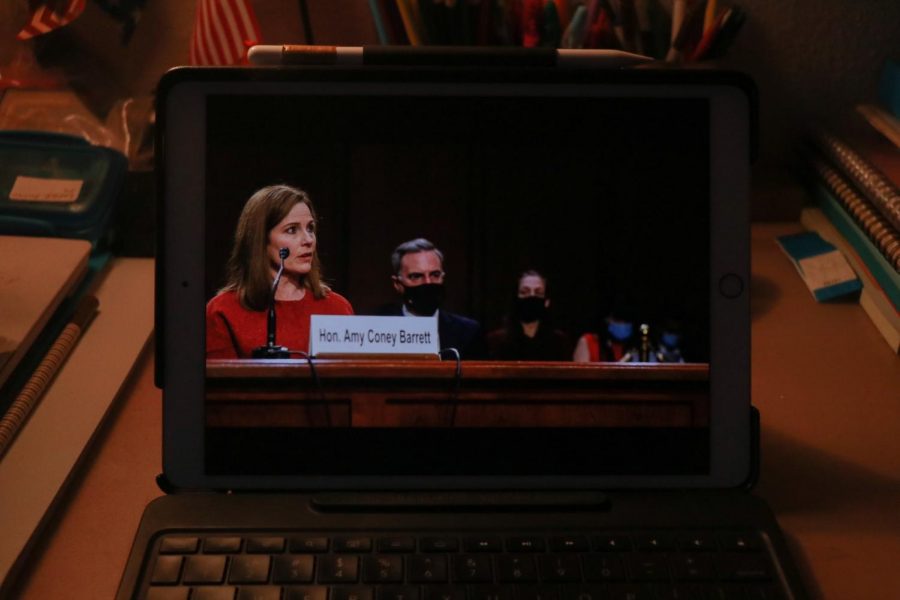Supreme Court Nominee Amy Coney Barrett Poses An Extreme Threat To The Land of the Free
With the nomination of Judge Amy Coney Barrett for Supreme Court rapidly coming to an end, many Americans across the U.S. brace for impact as a new wave of conservative agenda would begin.
October 21, 2020
Time is running out.
In the wake of Supreme Court Justice Ruth Bader Ginsburg’s death, President Donald Trump has selected Federal Judge Amy Coney Barrett to be nominated as Ginsburg’s replacement.
Barrett serves as a judge in the United States Court of Appeals for the Seventh Circuit. Her controversial opinions on gun laws, voting rights, worker rights, and illegal immigration align with far-right viewpoints. If she is confirmed by the Senate, the agenda of the Trump administration is likely to be fulfilled further.
Ginsburg was a trailblazer — she stood up for fighting for equality and civil rights. Everyone has somehow benefited from Ginsburg’s contributions to society.
Barrett is the antithesis of Ginsburg’s efforts. She stands for depriving certain groups of fundamental rights and shows in her behavior that she will look the other way if Trump attempts to challenge the outcome of the 2020 presidential election. To confirm Barrett is to undo all of Ginsburg’s work and jeopardize the land of the free.
With the push for Ginsburg to be replaced just weeks away from the election, there seems to be a double standard.
In 2016, former President Barack Obama nominated Merrick Garland to fill the empty seat on the Supreme Court following the death of Supreme Court Justice Antonin Scalia.
Obama was criticized for attempting to fill the spot on the Supreme Court so close to the 2016 election. Senate majority leader Mitch McConnell argued that there should not be a Supreme Court nomination so close to the presidential election, but rather that the nomination should await until after the fact.
McConnell’s argument is contradictory, because Obama announced his Supreme Court pick 237 days before the 2016 election, as opposed to Trump nominating Barrett 45 days before the 2020 election.
However, with Trump looking to Barrett to undo all of Ginsburg’s revolutionary accomplishments for women and healthcare, the Republican members of Congress have been falling in line, allowing Barrett’s confirmation hearings to take place during the build up to the most pivotal election in American history.
Barrett belongs to the People of Praise, a faith group affiliated with Christianity, in which women are expected to be subservient to men. Members’ private lives are dictated by the church. They strictly believe marriage should only be between a man and a woman.
California Senator Dianne Feinstein grilled the judge on whether she would rule in favor of reversing the freedoms and protections of the LGBTQ+ community.
In response to this question, Barrett replied, “I have no agenda. I do want to be clear that I have never discriminated on the basis of sexual preference and would not discriminate on the basis of sexual preference.”
Barrett’s choice of words, “sexual preference,” is problematic because she is suggesting that a person’s sexual identity is a choice, like a preference for apples or oranges.
This remark made by Barrett caught the attention of many, including Ritchie Torres, a Democratic congressional candidate from the Bronx. “As a gay man, I do not have a ‘sexual preference’ any more than I have a racial preference or an ethnic preference,” Torres said. “I have a sexual identity. Amy Coney Barrett’s view on sexuality, much like her judicial philosophy, is a relic of the past.”
Someone’s sexual orientation is neither a preference nor a choice. The fact that Barrett is not educated on this subject proves that she can’t be trusted to defend the rights of the LGBTQ+ community.
Just because Barrett is a woman who is in a position of power, it does not inherently mean that she is a feminist icon who deserves recognition to the level of Ginsburg. She shouldn’t be allowed to use her authority to create complications for marginalized groups who are less privileged than herself and her peers.
For example, Barrett declined to clearly answer Senator Amy Klobuchar’s question on whether she supports eliminating the Affordable Care Act that was put in place by the Obama Administration. The Affordable Care Act guarantees financial support for people with pre-existing health conditions, and if abolished, the loss of healthcare could be detrimental to millions of Americans.
According to The Balance, medical bills are the number one cause of bankruptcy in the United States. If Barrett helps overturn the Affordable Care Act, it is more than likely that millions of Americans will lose their health insurance, and millions more will pay higher premiums for the same or worse insurance plans.
This does not happen in any other developed country. People should not lose their homes as a result of the cost of a surgery.
In her nomination hearing, Barrett was asked to recite the five freedoms of the First Amendment. She was unsuccessful in this, forgetting the final freedom, the right to petition. She looked puzzled as she seemingly scanned the room for an answer. “What else am I missing?” she asked.
While I can sympathize that a pop quiz can be rather off-putting, she did attend law school to learn the law itself. Her shortcoming to name the five freedoms of the First Amendment reflects incompetence to enforce the law if she can’t even remember the rights people are entitled to.
In addition to the five freedoms mishap, Barrett repeatedly danced around answering questions posed by the Senate.
When grilled by Feinstein and Illinois Senator Dick Durbin about whether the Constitution or federal law gives the President the authority to delay an election unilaterally, she refused to provide a clear and definitive answer.
Barrett has also shown that combating climate change does not take a high position on her judicial to-do-list. “You know, I’m certainly not a scientist,” Barrett said at one point during her hearing. “I’ve read things about climate change. I would not say I have firm views on it.”
Our future on Earth depends on leaders who not only believe in science, but fully understand its place in government policy and give full support to scientific study and research.
If Barrett is confirmed, tremendous damage will be inflicted to underprivileged groups — she is an extremist, she is unqualified, and her viewpoints put marginalized groups in danger.
In response to Barrett’s likely confirmation, the future Democratic majority Senate should expand the Supreme Court in order to achieve judicial balance. Amy Coney Barrett is not a viable substitute for Ruth Bader Ginsburg.






Baby Wolfe • Oct 22, 2020 at 12:07 pm
I encourage students of conservative views who support Judge Barret’s nomination to speak up.
Avery Rush • Oct 21, 2020 at 9:44 pm
this is so well written and an important issue to discuss!! good job mia